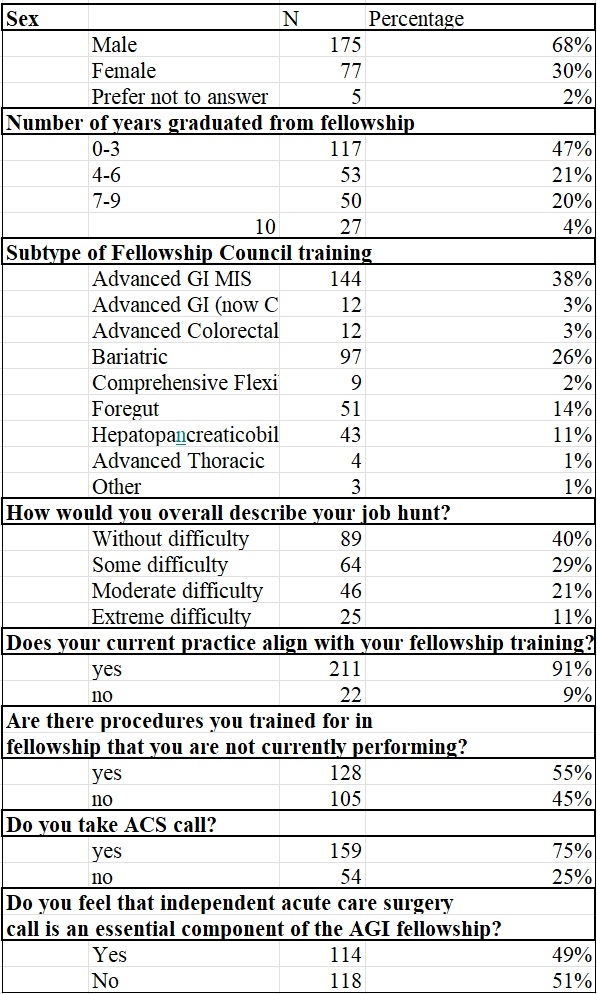Back to 2024 Abstracts
THE IMPACT OF FELLOWSHIP TRAINING ON CURRENT PRACTICE PATTERNS AND THE JOB MARKET: A SURVEY OF FELLOWSHIP COUNCIL GRADUATES
Michael Jureller
*1, D Rohan Jeyarajah
2,3, Imran Hassan
4, Maria Altieri
51General Surgery, NYU Langone Hospital - Long Island, Mineola, NY; 2Methodist Richardson Medical Center, Richardson, TX; 3Texas Christian University, Fort Worth, TX; 4University of Iowa Health Care, Iowa City, IA; 5University of Pennsylvania, Philadelphia, PA
Introduction: General surgery has grown significantly in the last two decades with the need for advanced training and expertise. The Fellowship Council (FC) trains approximately 200 fellows annually. We aim to analyze FC graduates' training, current practice, and their view of the job market.
Methods: Survey data was collected from May 2022 to June 2022 via email distribution to the available database of 2119 previous FC graduates from 2012 to 2021. The survey was composed of 53 questions, no compensation was given.
Results: There were 257 respondents to the survey. 47% of responses came from surgeons within the first 3 years of their career. 38% were designated advanced GI MIS, 26% bariatric, 14% foregut, and the remaining 22% hepatobiliary, advanced/complex GI, advanced endoscopy and colorectal. Most surgeons had acute care surgery as part of their training. 91% of graduates to have practices which align with their training, however 75% of surgeons do take acute care surgery call, and 55% do not perform operations trained for in fellowship. Over 60% of surgeons had difficulty securing employment.
Discussion: Despite the push for surgeons with advanced skill sets and specialized practices, there is still a high need for emergency general surgery care. Most surgeons have a diverse case-mix including both niche specialization and general surgery. There may be an under-utilization of their advanced training or a lag time bias as it can take years to establish a speciality practice. Hospital practices may play a roll as well depending on a particular institutions' emergency general surgery coverage models. The challenge in obtaining employment may be due to the saturation of the market or maybe bias from hiring challenges around the COVID pandemic.
Conclusions: Most surgeons with FC training practice surgery within their domains of training and with some component of acute care surgery. Despite the desire to hire fellowship trained surgeons, most FC graduates experience some degree of difficulty in seeking employment.

Demographic and highlighted survey data on FC graduates
Back to 2024 Abstracts
